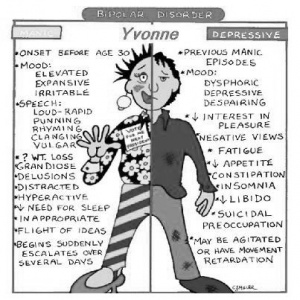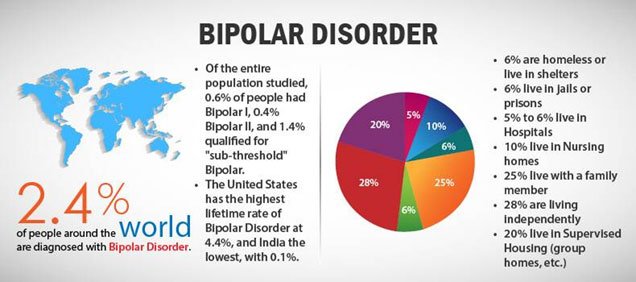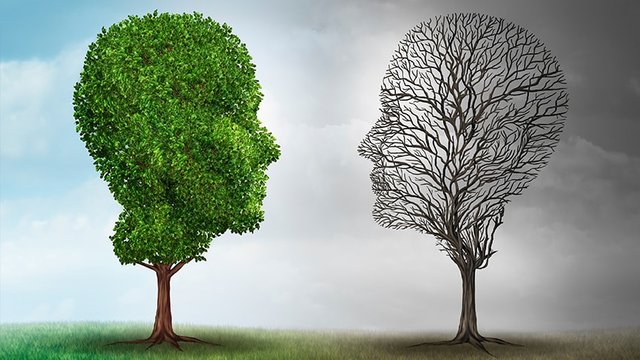Bipolar disorder...some mental condition or disease of human
please read once and try to understand my blog..its very important for us.....
today i am talking about bipolar disorder
What Are the Symptoms of Bipolar Disorder?
In bipolar disorder, the dramatic episodes of high and low moods do not follow a set pattern. Someone may feel the same mood state (depressed or manic) several times before switching to the opposite mood. These episodes can happen over a period of weeks, months, and sometimes even years.
How severe it gets differs from person to person and can also change over time, becoming more or less severe.
Symptoms of mania ("the highs"):
Excessive happiness, hopefulness, and excitement
Sudden changes from being joyful to being irritable, angry, and hostile
Restlessness
Rapid speech and poor concentration
Increased energy and less need for sleep
Unusually high sex drive
Making grand and unrealistic plans
Showing poor judgment
Drug and alcohol abuse
Becoming more impulsive
During depressive periods ("the lows"), a person with bipolar disorder may have:
Sadness
Loss of energy
Feelings of hopelessness or worthlessness
Not enjoying things they once liked
Trouble concentrating
Uncontrollable crying
Trouble making decisions
Irritability
Needing more sleep
Insomnia
Appetite changes that make them lose or gain weight
Thoughts of death or suicide
Attempting suicide
Who Gets Bipolar Disorder?
When someone develops bipolar disorder, it usually starts when they're in late adolescence or young adulthood. Rarely, it can happen earlier in childhood. Bipolar disorder can run in families.
Men and women are equally likely to get it. Women are somewhat more likely than men to go through "rapid cycling," which is having four or more distinct mood episodes within a year. Women also tend to spend more time depressed than men with bipolar disorder.
Many people with the condition abuse alcohol or other drugs when manic or depressed. People with seasonal depression and certain anxiety disorders, like post-traumatic stress disorder (PTSD), are also more likely to have bipolar disorder.
What Causes Bipolar Disorder?
There is no single cause. Genes, brain changes, and stress can all play a role.
Researchers are studying how these factors affect bipolar disorder.
How Is Bipolar Disorder Diagnosed?
If you or someone you know has symptoms of bipolar disorder, talk to your family doctor or a psychiatrist. They will ask questions about mental illnesses that you, or the person you're concerned about, have had, and any mental illnesses that run in the family. You'll also get a checkup.
Bipolar disorder is treated with three main classes of medication: mood stabilizers, antipsychotics, and, while their safety and effectiveness for the condition are sometimes controversial, antidepressants.
Typically, treatment entails a combination of at least one mood-stabilizing drug and/or atypical antipsychotic, plus psychotherapy. The most widely used drugs for the treatment of bipolar disorder include lithium carbonate and valproic acid (also known as Depakote or generically as divalproex). Lithium carbonate can be remarkably effective in reducing mania, although doctors still do not know precisely how it works. Lithium may also prevent recurrence of depression, but its value seems greater against mania than depression; therefore, it is often given in conjunction with other medicines known to have greater value for depression symptoms, sometimes including antidepressants.
Valproic acid is a mood stabilizer that is helpful in treating the manic or mixed phases of bipolar disorder, along with carbamazepine (Equetro), another antiepileptic drug. These drugs may be used alone or in combination with lithium to control symptoms. In addition, newer drugs are coming into the picture when traditional medications are insufficient. Lamotrigine, another antiepileptic drug, has been shown to have value for preventing depression and, to a lesser degree, manias or hypomanias.
YOU MIGHT LIKE
WEBMD
Stay Informed
Sign up to receive WebMD’s free newsletters.
WEBMD
WebMDRx
Better drug prices from the name you can trust.
WEBMD
Advanced Breast Cancer
Practical Tips During Cancer Treatment
Home Environment and Bipolar Disorder
If someone you live with has bipolar disorder, maintain a calm environment, particularly when that person is in a manic phase. Keep to regular routines for daily activities -- sleeping, eating, and exercise. Adequate sleep is very important in preventing the onset of episodes. Avoid excessive stimulation. Parties, animated conversation, and long periods of watching television or videos can exacerbate manic symptoms. Alcohol or illicit drug use can cause or worsen mood symptoms and make prescription medicines work less effectively.
IMPORTANT! Help and Support
In the manic phase of bipolar disorder, patients may engage in risky activities, such as fast driving or certain risky sports. They should be monitored and prevented from taking chances, especially in a car. Drinks and foods containing caffeine -- tea, coffee, and cola-- should be allowed in moderation. Avoid alcohol at all times. It is very important for a patient experiencing manic symptoms to receive prompt psychiatric assessment. Family members may need to contact the doctor, because oftentimes patients in a manic or hypomanic episode have little insight into their illness and may refuse treatment. But prompt intervention, including possible medication adjustments at an early point in an episode, may prevent further problems and the need for hospitalization.
What is depression?
While we all feel sad, moody or low from time to time, some people experience these feelings intensely, for long periods of time (weeks, months or even years) and sometimes without any apparent reason. Depression is more than just a low mood – it's a serious condition that affects your physical and mental health. Depression affects how you feel about yourself and makes life more difficult to manage from day to day. The encouraging news is that there are a range of treatments, health professionals and services available to help with depression, as well as information on what you can do to help yourself.
What causes depression?
While we don’t know exactly what causes depression, a number of things are often linked to its development. Depression usually results from a combination of recent events and other longer-term or personal factors, rather than one immediate issue or event.
Life events
Research suggests that continuing difficulties – long-term unemployment, living in an abusive or uncaring relationship, long-term isolation or loneliness, prolonged work stress – are more likely to cause depression than recent life stresses. However, recent events (such as losing your job) or a combination of events can ‘trigger' depression if you’re already at risk because of previous bad experiences or personal factors.
Personal factors
Family history – Depression can run in families and some people will be at an increased genetic risk. However, having a parent or close relative with depression doesn’t mean you’ll automatically have the same experience. Life circumstances and other personal factors are still likely to have an important influence.
Personality – Some people may be more at risk of depression because of their personality, particularly if they have a tendency to worry a lot, have low self-esteem, are perfectionists, are sensitive to personal criticism, or are self-critical and negative.
Serious medical illness – The stress and worry of coping with a serious illness can lead to depression, especially if you’re dealing with long-term management and/or chronic pain.
Drug and alcohol use – Drug and alcohol use can both lead to and result from depression. Many people with depression also have drug and alcohol problems. Over 500,000 Australians will experience depression and a substance use disorder at the same time, at some point in their lives.1
Changes in the brain
Although there’s been a lot of research in this complex area, there’s still much we don’t know. Depression is not simply the result of a ‘chemical imbalance’, for example because you have too much or not enough of a particular brain chemical. It’s complicated, and there are multiple causes of major depression. Factors such as genetic vulnerability, severe life stressors, substances you may take (some medications, drugs and alcohol) and medical conditions can affect the way your brain regulates your moods.
Most modern antidepressants have an effect on your brain’s chemical transmitters (serotonin and noradrenaline), which relay messages between brain cells – this is thought to be how medications work for more severe depression. Psychological treatment can also help you to regulate your moods.
Effective treatment can stimulate the growth of new nerve cells in circuits that regulate your mood, which is thought to play a critical part in recovering from the most severe episodes of depression.
Remember ...
Everyone’s different and it's often a combination of factors that can contribute to developing depression. It's important to remember that you can't always identify the cause of depression or change difficult circumstances. The most important thing is to recognise the signs and symptoms and seek support.
  (
( )
)
Please help people who are around you,observe them,observe yourself..dont make fun of anyone..it can be dangerous for them..
if you like my blog then upvote,comment,reply plz
super
Thanks many things i can know from here
may understand it
We should always be careful to avoid such a disease
some mental condition or disease of human
this is the good post friend.
wow nice
nice post everyday,your my inspiration
nice scenary
good
Congratulations @jannatulbristy! You have completed some achievement on Steemit and have been rewarded with new badge(s) :
Click on any badge to view your own Board of Honor on SteemitBoard.
For more information about SteemitBoard, click here
If you no longer want to receive notifications, reply to this comment with the word
STOPnice